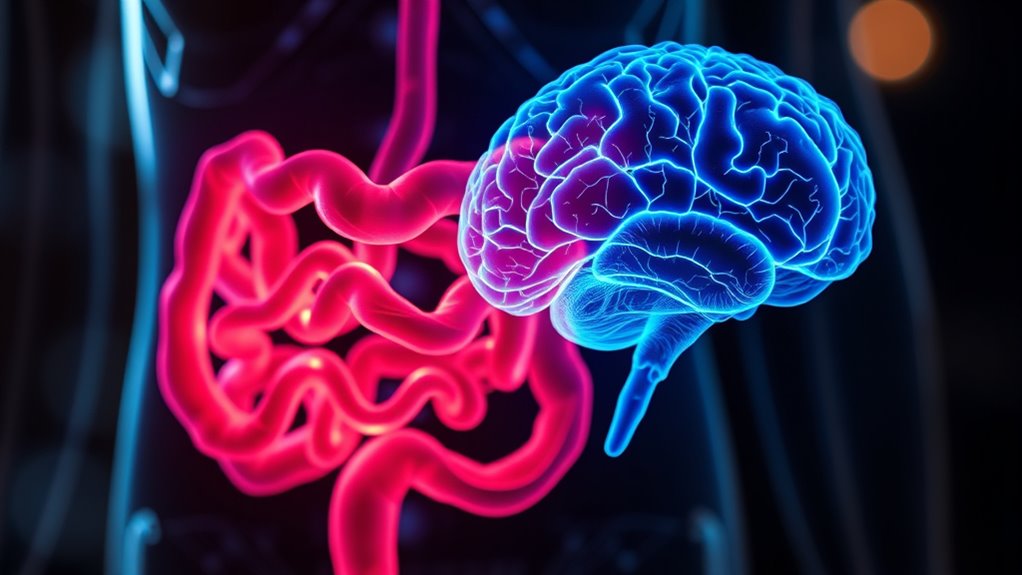The gut-brain connection is a complex system where your digestive system talks directly with your brain through neural pathways like the vagus nerve, hormones, and microbiota. This communication influences your mood, stress levels, and overall health. Disruptions, stress, or poor diet can impair this link, leading to issues like anxiety, digestive discomfort, or mood swings. Understanding how to support this connection through lifestyle changes can help you feel better—there’s much more to discover below.
Key Takeaways
- The gut-brain axis is a communication network linking the gastrointestinal system with the central nervous system through neural, hormonal, and immune pathways.
- The vagus nerve plays a central role by transmitting sensory information from the gut to the brain and motor commands to digestive organs.
- Gut microbiota influence mental health by producing neuroactive compounds like serotonin and supporting balanced inflammation.
- Stress, anxiety, and lifestyle factors can disrupt gut-brain communication, leading to digestive issues and mood disturbances.
- Strategies like a healthy diet, probiotic foods, stress management, and physical activity can optimize the gut-brain connection and overall well-being.

Nature's Bounty Lactobacillus Acidophilus Probiotic Supplement – Daily Probiotic for Women/Men Digestive Health, 100 Million Organisms, Vegetarian, 1 Serving per Day, 120 Tablets
SUPPORTS DIGESTIVE HEALTH (1): Nature’s Bounty Lactobacillus probiotic tablets provide 100 million active cultures; supporting your digestive health…
As an affiliate, we earn on qualifying purchases.
As an affiliate, we earn on qualifying purchases.
The Anatomy of the Gut-Brain Axis
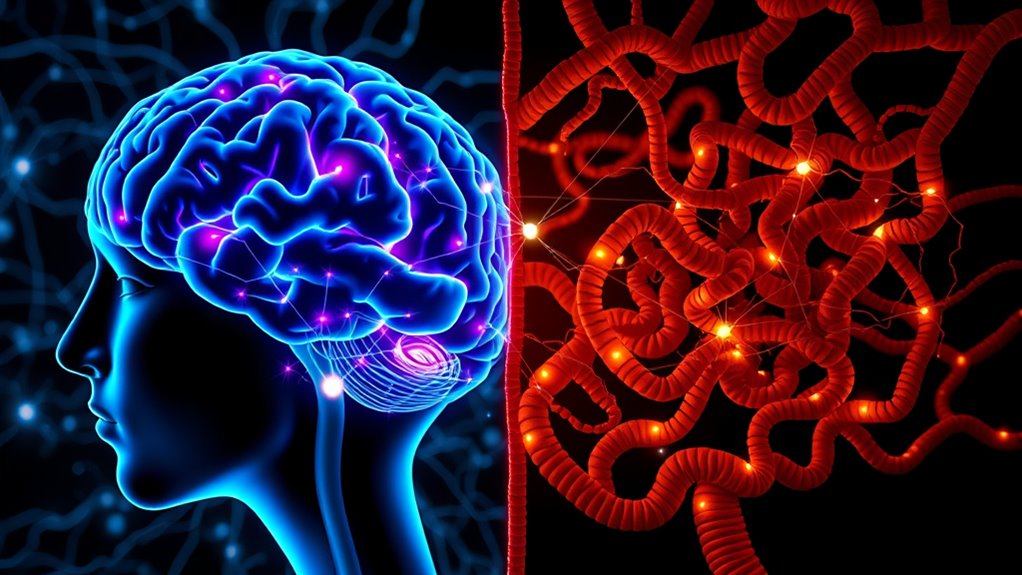
The gut-brain axis is a complex communication network that links your gastrointestinal system with your central nervous system. At its core, the enteric nervous system—often called your “second brain”—controls many gut functions independently but also communicates with your brain. This system contains numerous neurotransmitter pathways, which transmit signals between the gut and brain, influencing mood, digestion, and overall health. These pathways include chemicals like serotonin and dopamine, which are essential for regulating your emotions and gut motility. The enteric nervous system consists of a vast network of neurons embedded in your gut lining, enabling real-time responses to changes in your digestive environment. Additionally, recent advancements in neural network integration enhance our understanding of how these pathways influence both mental and physical health. Together, these components form a sophisticated system that keeps your gut and brain in constant, dynamic communication.

Vagus Nerve Deck: 75 Exercises to Reset Your Nervous System
As an affiliate, we earn on qualifying purchases.
As an affiliate, we earn on qualifying purchases.
How the Vagus Nerve Facilitates Communication
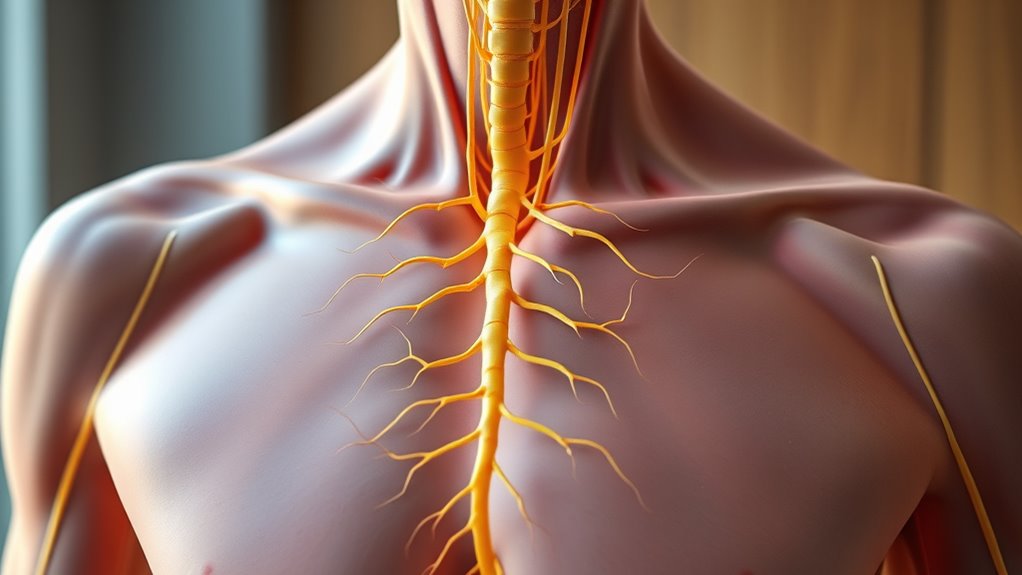
Among the various pathways that enable communication between your gut and brain, the vagus nerve plays a central role. It acts as a superhighway for neural communication, transmitting signals in both directions. Here’s how it works:
The vagus nerve is the main highway for bidirectional communication between your gut and brain.
- It sends sensory information from your gut to your brain, alerting you to fullness or discomfort.
- It relays motor commands from your brain to regulate digestion, such as enzyme release.
- It helps coordinate your body’s stress responses and immune functions through neural signals.
- Its function is supported by affiliates and privacy policies, which provide transparency about data and tracking involved in understanding these neural pathways.

Quality of Life Pure Balance Serotonin Premium–Helps Boost Serotonin & Cortisol Levels – Includes 5-HTP, Venetron, Sensoril, Vitamin D3 & L-Theanine–60 Capsules
SUPPORTS MOOD: Our PureBalance Serotonin supplement is made with natural mood enhancing herbs to help reduce stress, support…
As an affiliate, we earn on qualifying purchases.
As an affiliate, we earn on qualifying purchases.
The Role of Hormones in Gut-Brain Signaling
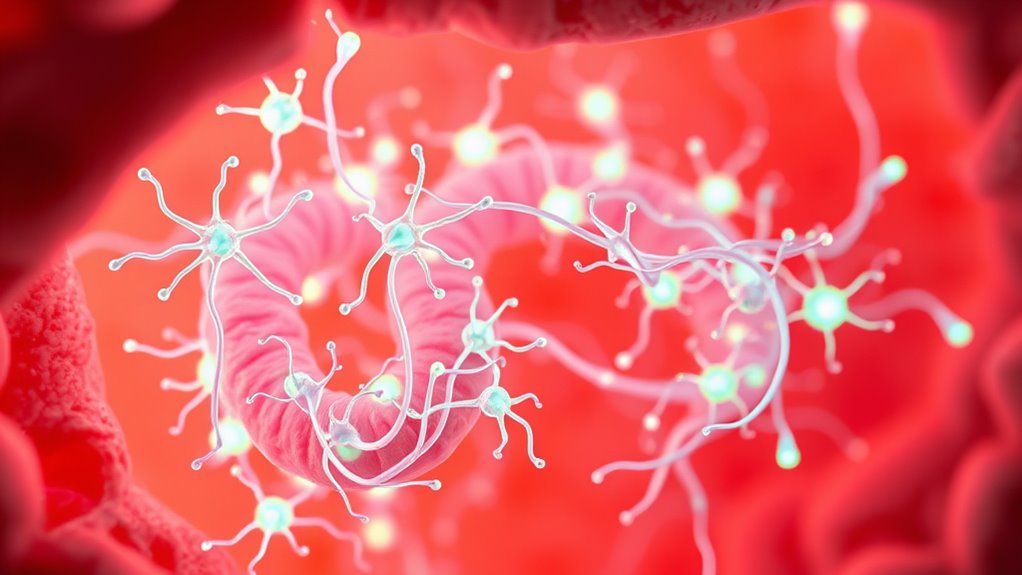
Hormones serve as essential chemical messengers that facilitate communication between your gut and brain, extending beyond neural pathways to influence your mood, appetite, and stress levels. Through hormonal regulation, your gut releases specific hormones like ghrelin and leptin, which signal hunger and fullness, guiding your eating behaviors. Endocrine signaling allows these hormones to travel through your bloodstream, reaching your brain and triggering responses that affect your emotional state and stress response. This complex system ensures your body maintains balance and reacts appropriately to changes in your environment. Additionally, water-based activities such as aquatic exercise can positively impact mental well-being by reducing stress and promoting relaxation through physical activity in a refreshing environment. By understanding how hormones mediate gut-brain communication, you recognize the powerful role your internal chemical signals play in shaping your mental and physical health. Hormonal regulation is, consequently, central to this intricate connection.

Stress Relief Essential Oil Blend 30 ml – Stress Relief & Calm Essential Oil for Diffusers & Aromatherapy – Promotes Relaxation & Rest – Nexon Botanics
Comforting Aroma: It helps create a fresh and pleasant ambiance.
As an affiliate, we earn on qualifying purchases.
As an affiliate, we earn on qualifying purchases.
Microbiota: The Tiny Influencers of Mental Health

Your gut hosts trillions of microorganisms collectively known as the microbiota, which actively influence your mental health in ways you might not realize. The diversity of your microbiota plays a vital role in maintaining mental well-being.
Here’s how it impacts you:
- Microbiota diversity supports a balanced production of neuroactive compounds, affecting mood and stress levels.
- A diverse microbiota helps prevent the overgrowth of harmful bacteria, reducing inflammation linked to mental health issues.
- Certain beneficial microbes produce neurotransmitters like serotonin, directly influencing your emotional state.
- Incorporating wall organization systems that optimize space can also create a more calming and organized environment, indirectly supporting mental health.
Fostering microbiota diversity through diet and lifestyle choices can positively impact your mental health, highlighting the tiny influencers that shape your mind from within.
The Impact of Gut Health on Mood and Emotions
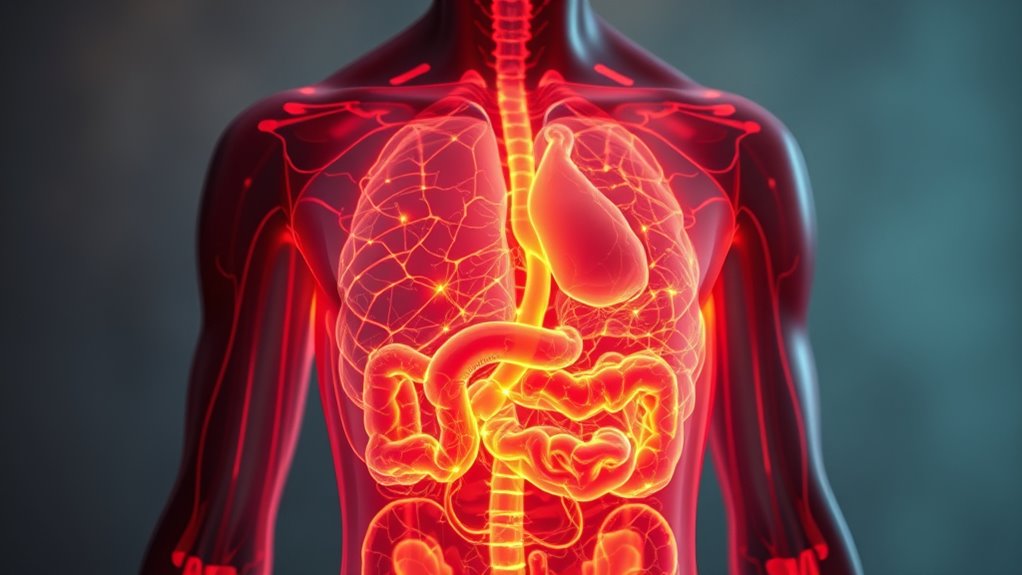
Since your gut directly influences the production of mood-regulating chemicals, it plays a crucial role in shaping your emotional well-being. A healthy gut can boost your mood and emotional resilience, helping you handle stress better. Taking probiotic supplements supports your gut microbiota, promoting the growth of beneficial bacteria that produce neurotransmitters like serotonin and GABA—key players in mood regulation. When your gut flora is balanced, you’re more likely to experience stable emotions and improved mental health. Moreover, understanding the ethical hacking of how vulnerabilities can be exploited emphasizes the importance of safeguarding your mental health through balanced gut bacteria. Conversely, an unhealthy gut can lead to feelings of anxiety and depression. By prioritizing gut health through diet, probiotics, and lifestyle choices, you can positively impact your emotional resilience and overall mental clarity. Your gut truly holds the power to influence how you feel daily.
Stress and Its Effects on the Gut-Brain Relationship
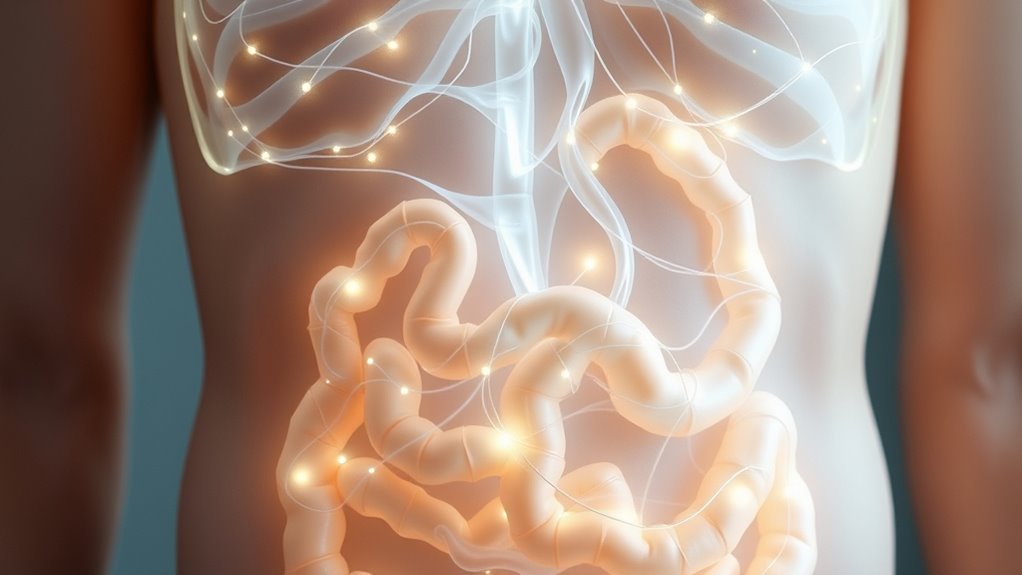
When you’re stressed, your gut can quickly become imbalanced, affecting digestion and overall health. Anxiety can also make it harder for your digestive system to work properly, creating a frustrating cycle. Understanding how stress impacts your gut helps you take control of both your mental and physical well-being. Recognizing Relationship Dynamics can improve your communication and reduce stress-related gut issues.
Stress-Induced Gut Imbalance
Stress can profoundly disrupt the balance of your gut microbiome, triggering a cascade of effects that impact both your digestive health and mental well-being. When you’re stressed, your body releases hormones that alter gut flora, reducing beneficial bacteria and encouraging harmful bacteria growth. This imbalance can lead to symptoms like bloating, irregularity, and discomfort. Additionally, understanding the vibrational state related to stress can help you better manage your body’s response and support overall health. To protect your gut, effective stress management is essential. Here are three ways to support your gut flora during stressful times:
- Practice deep breathing or meditation daily
- Incorporate probiotic-rich foods into your diet
- Prioritize regular exercise to reduce stress levels
Anxiety’s Impact on Digestion
Anxiety can profoundly disrupt your digestion by sending signals through the gut-brain axis that alter normal gastrointestinal function. When you’re stressed or anxious, your body releases hormones that slow digestion or cause discomfort. This affects your gut flora, making it harder for beneficial bacteria to thrive and maintain balance. Practicing mindful eating helps you stay present and reduces anxiety around meals, supporting healthy digestion. Incorporate relaxation techniques to ease stress, which positively impacts your gut-brain connection. Here’s a quick view:
| Stress Effect | Impact on Digestion | Practical Tip |
|---|---|---|
| Increased cortisol levels | Slows gut motility | Practice deep breathing |
| Reduced gut flora diversity | Causes bloating, discomfort | Eat probiotic-rich foods |
| Muscle tension | Impairs digestion | Stretch or yoga |
| Anxiety triggers | Leads to irregular eating | Mindful eating habits |
| Disrupted hormone signals | Alters gut function | Regular relaxation routines |
Additionally, understanding the gut-brain connection can help you develop strategies to improve both mental health and digestive wellbeing.
Dietary Choices That Support a Healthy Connection

Choosing the right foods can profoundly strengthen the gut-brain connection, enhancing mood, cognition, and overall mental health. To support this link, focus on increasing your fiber intake, which feeds beneficial gut bacteria. Incorporate fermented foods like yogurt, kefir, sauerkraut, and kimchi to introduce healthy probiotics that improve gut health. Here are three dietary choices to contemplate: 1. Eat a variety of fiber-rich foods such as fruits, vegetables, and whole grains. 2. Add fermented foods daily to boost probiotic diversity. 3. Limit processed foods and sugars that can disrupt gut bacteria balance. Additionally, understanding Forsale 100 can help you find affordable options to include these healthy foods in your diet.
Disorders Linked to Gut-Brain Imbalance
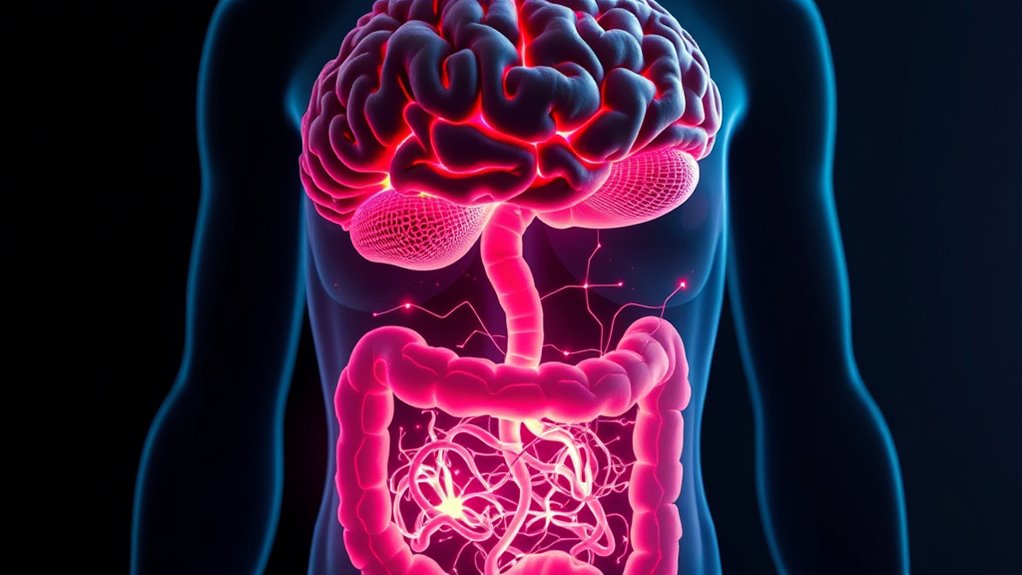
Disruptions in the gut-brain connection have been linked to a range of mental health and neurological disorders. You may notice that imbalances in gut bacteria can influence psychological disorders like anxiety and depression, while also playing a role in neurodegenerative diseases such as Parkinson’s and Alzheimer’s. These conditions often involve inflammation and altered neurotransmitter production, connecting gut health to brain function. Here’s a quick overview:
| Disorder Type | Symptoms | Impact |
|---|---|---|
| Psychological Disorders | Mood swings, anxiety, depression | Affected by gut microbiota changes |
| Neurodegenerative Diseases | Memory loss, tremors | Linked to gut inflammation |
| Gut Dysbiosis | Digestive discomfort | Contributes to mental health issues |
Understanding how developmental factors influence gut health can help in addressing these interconnected issues.
Emerging Research and Future Perspectives

Emerging research continues to uncover the intricate ways the gut-brain connection influences health, opening new avenues for diagnosis and treatment. Advances in neuroplasticity research reveal how gut health can impact brain adaptability, suggesting potential for targeted therapies. Pharmacological interventions are also evolving, aiming to modulate gut microbiota or neurotransmitter pathways directly. Here are some promising developments:
- New drugs designed to enhance neuroplasticity by targeting gut-derived signals.
- Innovative probiotics and prebiotics that support brain function through microbiome modulation.
- Biomarkers identified for early detection of gut-brain imbalances, improving personalized medicine.
These insights suggest that future treatments could become more precise, combining neural and microbiome-focused strategies to optimize mental and physical health. Staying informed on these advancements puts you at the forefront of gut-brain health innovation.
Practical Ways to Enhance Your Gut-Brain Health

To boost your gut-brain health, start by making simple lifestyle changes that support your microbiome and mental clarity. Incorporate probiotic supplements into your daily routine to introduce beneficial bacteria that enhance gut diversity. Eating a balanced diet rich in fiber, fermented foods, and whole grains also fosters a healthy microbiome. Additionally, practicing meditation techniques can reduce stress, which negatively impacts gut health and brain function. Regular meditation helps lower cortisol levels, promoting better digestion and mental focus. Staying active with exercise further supports your gut-brain axis. Remember, small consistent steps—like taking probiotics, engaging in meditation, and eating mindfully—can substantially improve your overall well-being and strengthen the crucial connection between your gut and brain.
Frequently Asked Questions
Can Gut Health Influence Cognitive Performance?
Your gut health can profoundly influence your cognitive performance. A diverse microbiome enhances neurotransmitter production, which affects mood, focus, and memory. When your microbiome diversity is balanced, it supports better communication between your gut and brain. Conversely, poor gut health can lead to decreased neurotransmitter levels, impairing mental clarity and concentration. By maintaining a healthy gut, you optimize your brain function and overall mental well-being.
How Quickly Can Gut-Brain Communication Affect Mood?
Imagine your gut and brain as dance partners, moving in perfect harmony. When neurotransmitter synthesis kicks in or the vagus nerve stimulates, mood shifts can happen within minutes. You might feel a wave of calm or anxiety almost instantly, like a switch flipping. This rapid communication shows how your gut can influence your mood swiftly, thanks to the intricate signaling pathways that connect your digestive system and brain.
Are There Specific Foods That Improve Gut-Brain Health?
You can boost your gut-brain health by eating specific foods like fermented foods and omega-3s. Fermented foods, such as yogurt, sauerkraut, and kimchi, introduce beneficial probiotics that support gut bacteria. Omega-3 fatty acids, found in fatty fish like salmon and walnuts, help reduce inflammation and improve mood. Incorporating these into your diet regularly may enhance your mental well-being and overall gut health.
What Are Early Signs of Gut-Brain Imbalance?
Spotting subtle signs signals your gut-brain imbalance. You might notice nagging nervousness, unpredictable mood swings, or digestive discomfort that disrupts daily life. Pay close attention to symptom recognition—such as fatigue, bloating, or brain fog—that could indicate imbalance indicators. Early detection helps you take timely steps toward restoring harmony, so listen to your body’s whispers and seek guidance if these signs persist.
Can Probiotics Treat Mental Health Disorders?
You might wonder if probiotics can treat mental health disorders. While they can boost microbiota diversity and support serotonin production, they aren’t a guaranteed cure. Probiotics may help improve mood and reduce anxiety for some people, but results vary. Always consult a healthcare professional before starting probiotics for mental health, as they work best when combined with other treatments and a balanced diet supporting your gut-brain connection.
Conclusion
By understanding and nurturing your gut-brain connection, you hold the power to transform your mental well-being. Think of your gut as the command center that influences your mood, stress levels, and overall happiness—it’s like having a supercomputer in your belly! Make smart dietary choices, stay mindful of your gut health, and embrace new research. The healthier your gut, the more unstoppable you’ll be in living your best, happiest life.
